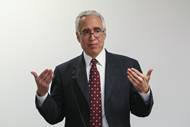From its very beginnings as a war-weary republic, the United States has always depended on citizen servants to lead its government. The Founding Fathers believed their young nation would not long survive as a representative democracy without leaders whose patriotism and love of justice would allow the new government to rise above the partisan divisions of the day.
These hopes for virtuous, wise leaders extended to what Philadelphia’s Benjamin Franklin called the “posts of honor” in the executive branch. Worried about the bold and fractious individuals who might be drawn to government in search of profit, Franklin proposed that executive officers receive “no salary, stipend, Fee or reward whatsoever for their service.” Although the Constitutional Convention quietly tabled his proposal without debate, Franklin expressed the young republic’s desperate need for executives motivated by public interest, not private gain.
Two hundred years later, the nation still depends on public executives motivated by public interest. Although the nation’s survival is obviously no longer in doubt, it has never asked more from the federal government and its 6,000 full- and part-time presidential appointees. Those appointees sit at the top of the world’s most powerful government, overseeing a vast inventory of endeavors designed to improve the quality of life in the nation and the world, and assuring democratic accountability to both the president and the public. As the federal agenda has expanded to keep pace with public demand, so has the need for presidential appointees committed to the idea of citizen service.
Yet, imagine for a moment the worst possible process for inviting those appointees to serve. It would begin with a 60-page stack of forms asking repetitive and intrusive questions to cover every possible embarrassment, continue with a White House review that can linger on for weeks, a Federal Bureau of Investigation fullfield investigation that leaves no stone unturned in the search for past offenses, a financial disclosure review that can require extensive financial remedies before the process moves ahead, and a Senate confirmation process filled with partisan acrimony, uncertainty, and delay. It would, as one former White House chief counsel remarked last fall, assume that all appointees were “innocent until nominated.”
It would also be a process that would favor people already living in Washington and working in government, not to mention those with the money to hire outside legal and financial advisers to complete the forms.
The problem, of course, is that this abusive process is not imaginary at all. It is the status quo. According to a survey of 435 appointees from the Reagan, Bush, and Clinton administrations conducted on behalf of The Presidential Appointee Initiative, delays in the process are increasing, confusion and embarrassment are growing, and frustration is rampant at every stage of the nomination and confirmation process. As we reported last spring, nearly half of the appointees interviewed said the Senate had made the process an ordeal, while a third said the same of the White House.
This report is not about the views of past appointees, however, but about the readiness to serve among today’s civic and corporate leaders. Simply asked, would America’s most talented leaders take a presidential appointment if offered? The answer is “yes and no.” Although they are overwhelmingly favorable to the prospect of service, America’s civic and corporate leaders have been watching the presidential appointments process decay over the past two decades. At least according to a random sample telephone survey of 580 top corporate, academic, nonprofit, think tank, lobbying, and state and local leaders who have never served as presidential appointees, these leaders worry about what they have seen.
Consider the following conclusions drawn from the survey:
America’s civic and corporate leaders are ready to serve. The vast majority of the 100 Fortune 500 executives, 100 college and university presidents, 85 nonprofit executives, 95 think tank scholars, 100 lobbyists, and 100 state and local government officials interviewed for this report think serving as a presidential appointee would be an honor, and four in 10 feel very favorable toward accepting an appointment.
Many of the nation’s civic and corporate leaders know little or nothing about the presidential appointments system. Nearly half of all respondents said they knew little or nothing about the system. Lobbyists, think tank scholars, and university presidents were the most knowledgeable, nonprofit executives were in the middle, and corporate CEOs and state and local government officials were the least informed.



